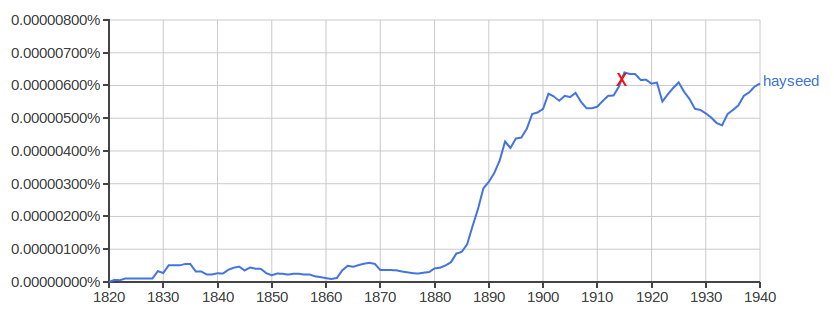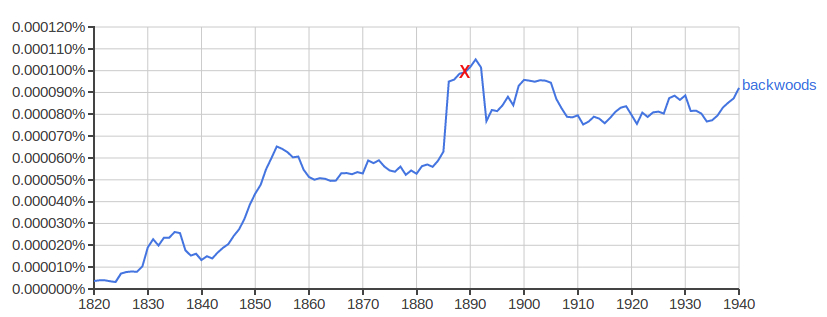Checking some predictions
« previous post | next post »
Tom Friedman is merely the latest commentator to turn a claim about conceptual change into a claim about word frequency. Thus Amanda Stoltzfus, "The Way And The How Of Teaching Domestic Economy In The County Public School", Proceedings of the Fourth Annual Session of the Texas State Farmers' Institute, 1914:
This is the day of the farmer. The vocation of farming is being dignified and respected by everybody. The Bankers' Association has recognized the importance of this industry to the rest of the country and is striving to help put agriculture upon a sound basis through a special agricultural committee. The term "hayseed" has been dropped from our vocabulary since a worldwide interest in country life has been awakened by the farm life commission. The word "farmer" is" becoming a synonym for intelligence, because today the man who succeeds on the land must work along scientific lines—more and more intensively, and less extensively. The world is realizing that the study of agriculture includes a bigger combination of sciences than any other study unless it be domestic economy; and that it requires more brains to be a farmer than it does to be anything else unless it be the farmer's wife, who presides over the farm home without which the farmer might as well go out of business.
Google Books doesn't have a "Texas" corpus, alas, but checking the general run of English-language books suggests that Ms. Stoltzfus got the pre-1914 direction of change pretty much backwards:

And here we have a full proto-Tom-Friedman, in the person of H.B. Kelley of the Kansas State Senate, quoted by Frank H. Betton in the Proceedings at the Seventh Annual Session of the National Convention of Chiefs and Commissioners of the Various Bureaus of Statistics of Labor in the United States, June 1889:
Forty years ago the population of the world existed in isolated neighborhoods, a part of which might suffer famine while others reveled in over-abundance. This is now changed, the multitude of neighborhoods having been consolidated into one vast civilization that reaches around the globe. Steam and electricity have obliterated time and space, and brought the remote regions of the earth into quick and easy communication with the great centers of civilization. The frontier has disappeared from the maps, while the term ‘backwoods’ has been dropped from our vocabulary. Every continent and island is supplied with means of transportation for its surplus products to the places where markets await them.
Res ipsa loquitur:

J.W. Brewer said,
May 24, 2014 @ 12:22 pm
Maybe it was a bit different in the late 19th century, but insofar as the primary sting of the pejorative use of "hayseed" is to imply lack of sophistication, cultural polish, and/or the broader set of city-mouse traits that could be given labels as varied as "urbanity" or "street smarts" — as opposed to lack of "brains" as such, the Stolzfus point doesn't even make much sense. For example, one could in the modern era simultaneously believe (at a stereotypical level) that software developers are brainy and quite technically competent at what they do, while deprecating them as lacking cultural polish and sophistication.
NQA2 said,
August 30, 2014 @ 2:51 pm
Well, the 'r' is another difference, as well as the vowel sound at the end.